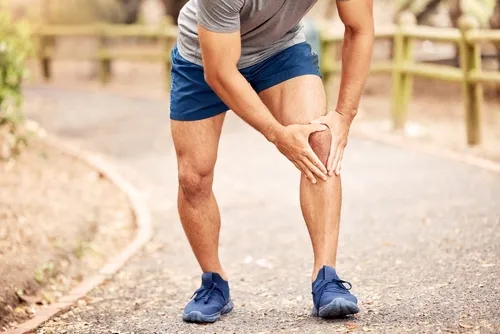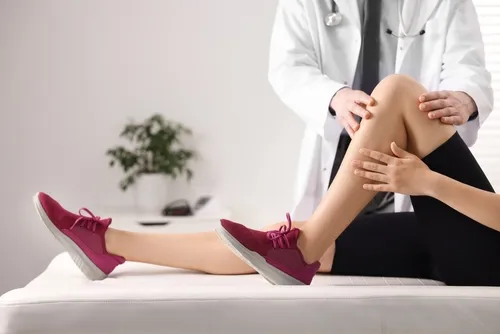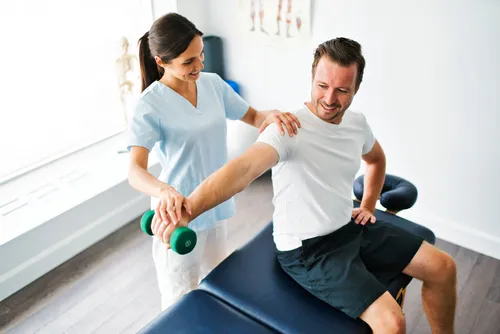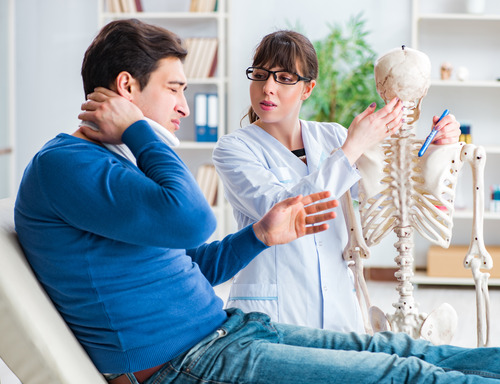Sports injuries are a frequent challenge for athletes and active individuals. Whether you’re exercising for fitness or enjoying recreational activities, the risk of injury is always present. At Georgia Spine & Orthopaedics, we are here to help you recover from a sports injury.
Our experienced team includes orthopedic doctors, neurologists, pain management specialists, physical therapists, and chiropractors. We treat patients at multiple locations across the Atlanta metro area.
What Causes Sports Injuries?
Sports injuries occur when your body experiences stress or strain beyond its capacity. While some injuries result from accidents, others are preventable with proper precautions. Common causes include:
- Overuse and Repetition: Repeated actions, such as throwing, running, or jumping, can wear down muscles, tendons, and bones, leading to overuse injuries like tendonitis or stress fractures.
- Improper Technique: Poor form during activities like lifting weights or running can strain muscles, joints, and ligaments.
- Inadequate Warm-Up or Cool-Down: Skipping warm-ups can lead to stiff muscles, increasing the likelihood of strains, while neglecting cool-downs may cause soreness and poor recovery.
- Physical Contact or Impact: Collisions or falls are common in contact sports like football or basketball, leading to fractures, dislocations, and concussions.
- Environmental Factors: Slippery surfaces, poor lighting, and uneven terrain can increase the risk of falls or missteps.
- Inappropriate Equipment: Ill-fitting or worn-out gear, like old running shoes or improperly sized protective gear, can fail to provide necessary support and protection.
What Are Common Sports Injuries?
At Georgia Spine & Orthopaedics, we treat a wide range of sports-related injuries. Below are detailed descriptions of some of the most common injuries:
Sprains and Strains
Sprains happen when ligaments (bands of tissue that attach bone to bone) are overstretched or torn. Sprains often occur in the ankles, knees, and wrists.
Meanwhile, strains are caused by overuse or overstretching of muscles or tendons (strands of tissue that connect muscle to bone). Strains commonly affect the hamstrings, back, and shoulders.
Common symptoms of sprains and strains include pain, swelling, and limited mobility.
Shin Splints
Shin splints cause pain along the shinbone (tibia) and are prevalent among runners and athletes who increase their training intensity too quickly. This condition is often linked to improper footwear, overuse, or running on hard surfaces.
Patellofemoral syndrome (Runner’s Knee)
Patellofemoral syndrome, often referred to as “runner’s knee,” is characterized by pain at the front of the knee, around or behind the kneecap (patella).
The condition is commonly caused by:
- Improper alignment of the kneecap as it moves over the femur
- Repetitive stress from high-impact activities such as running, jumping, or squatting
- Weak or imbalanced muscles around the knee and hips
Symptoms typically include a dull, aching pain that worsens with activities like climbing stairs, squatting, or sitting for prolonged periods. Treatment often involves strengthening exercises to correct muscle imbalances, stretching, rest, and modifying activities.
Tendonitis
Tendonitis is inflammation of a tendon, often resulting from repetitive motions. Common types include:
- Tennis Elbow: Pain and tenderness in the elbow caused by repetitive arm and wrist movements.
- Achilles Tendonitis: Pain at the back of the ankle, frequent among runners and jumpers.
- Patellar tendonitis (jumper’s knee): Pain in the patellar tendon at the front of your knee, common in sports that involve jumping.
Broken Bones/Fractures
Fractures can range from minor hairline cracks to complete breaks.
Stress fractures are small cracks in the bone that typically develop from overuse or repetitive force, such as running or jumping. They are more common in people who play high-impact sports. You may need a walking boot, brace, or crutches while the stress fracture heals.
Immediate treatment for broken bones is essential to prevent complications and ensure proper healing. Serious fractures may require orthopedic surgery.
Dislocations
Dislocations occur when bones are forced out of their normal positions in a joint. This injury is common in contact sports and often involves the shoulders, knees, or fingers. Symptoms include severe pain, visible deformity, and immobility.
Ligament Tears
Tears in ligaments, such as the ACL (anterior cruciate ligament) in the knee, are common in sports involving sudden stops, jumps, or changes in direction. These injuries often require advanced treatment, including surgery and rehabilitation.
Concussions
A concussion is a type of traumatic brain injury caused by a blow to the head or violent shaking. Symptoms include headaches, dizziness, confusion, and memory problems. Concussions require prompt medical care to prevent long-term effects.
What Are the Signs and Symptoms of a Sports Injury?
Recognizing the symptoms of a sports injury is crucial for early intervention. Common signs include:
- Pain: Persistent or sharp pain in the affected area, which may worsen with movement.
- Swelling and Bruising: These are common signs of soft tissue damage, fractures, or dislocations.
- Reduced Range of Motion: Stiffness or difficulty moving a joint or muscle.
- Instability: Feeling that a joint is giving way, particularly in knee or ankle injuries.
- Deformity: Misalignment or unusual appearance of a bone or joint.
- Popping or Crunching Sounds: These may indicate a ligament tear or fracture.
- Headache or Nausea: Symptoms of a concussion or head injury.
If you experience these symptoms, seek medical treatment right away, especially for severe pain, visible deformities, or symptoms of a concussion.
How Is a Sports Injury Diagnosed?
At Georgia Spine & Orthopaedics, we use a thorough approach to diagnose sports injuries accurately:
- Medical History: Understanding how and when the injury occurred, along with details about your activity level and any previous injuries.
- Physical Examination: Assessing the affected area for pain, swelling, range of motion, and stability.
- Imaging Tests:
- X-rays to identify fractures or bone dislocations.
- MRI Scans to detect ligament, tendon, or cartilage injuries.
- CT Scans for detailed views of bones and surrounding tissues.
By combining these tools, our doctors can accurately diagnose your injury and develop a personalized treatment plan.
How Long Does It Take to Recover from a Sports Injury?
Recovery times vary widely based on the severity of the injury, the treatment plan, and the individual’s overall health. Here’s a general timeline:
- Mild Injuries (Sprains, Strains, Minor Tendonitis): Recovery may take 1–3 weeks with rest, physical therapy, and at-home care.
- Moderate Injuries (Partial Tears, Stress Fractures): Healing often requires 6–12 weeks, including bracing or immobilization and physical therapy.
- Severe Injuries (Fractures, Full Tears): Recovery may take several months and may involve surgery, followed by extensive rehabilitation.
Our team will provide a detailed recovery timeline based on your diagnosis and closely monitor your progress.
How Can I Treat a Sports Injury at Home?
For minor injuries, the RICE method is an effective first-line treatment:
- Rest: Avoid using the injured area to prevent further damage.
- Ice: Apply ice packs for 20 minutes every 2–3 hours to reduce swelling and numb pain.
- Compression: Wrap the injury with an elastic bandage to limit swelling and provide support.
- Elevation: Keep the injured limb raised above heart level to minimize swelling.
Over-the-counter medication can help reduce pain and swelling.
You should seek medical attention if you notice any of the following symptoms:
- Severe pain, swelling, or deformity.
- Difficulty bearing weight or moving the injured area.
- Symptoms of a concussion, such as confusion or loss of consciousness.
What Treatments Do You Offer for Sports Injuries?
At Georgia Spine & Orthopaedics, we provide a range of treatments for sports injuries.
Pain Management
At Georgia Spine & Orthopaedics, we employ various pain management options. Medications and injections (such as corticosteroids or nerve blocks) can reduce inflammation and alleviate pain. We offer minimally invasive procedures like radiofrequency ablation (RFA). RFA involves using heat to disrupt pain signals from nerves, which can provide long-term relief.
For individuals experiencing severe or persistent pain that does not respond to other treatments, spinal cord stimulators (SCS) can be an effective solution. A spinal cord stimulator is a device that is implanted to deliver electrical impulses to the spinal cord, which helps to mask pain signals before they reach the brain.
Chiropractic Care
Chiropractic care can be beneficial for many sports injuries, especially issues like back pain, neck pain, and joint dysfunction. By carefully manipulating the spine and joints, chiropractic adjustments help to realign the body, reduce inflammation, and improve the body’s range of motion.
In addition to spinal adjustments, our chiropractors provide soft tissue therapy, stretching exercises, and recommendations for proper posture and movement patterns. These techniques are designed to improve flexibility, promote faster healing, and strengthen the affected areas.
Physical Therapy
Physical therapy is one of the most effective treatment options for recovering from sports injuries. Our physical therapists develop personalized exercise programs to strengthen muscles, improve flexibility, and restore range of motion. Whether you are healing from a muscle strain, ligament tear, or orthopedic surgery, physiotherapy can aid your recovery.
Stretching and strengthening exercises help correct muscle imbalances, improve joint function, and prevent future injuries. Our physical therapy programs incorporate manual therapy to promote blood flow, reduce muscle tension, and alleviate pain.
Orthopedic Treatment and Orthopedic Surgery
Our orthopedic doctors treat fractures, joint pain, and injuries to muscles, ligaments, and tendons.
Orthopedic surgery may be necessary for severe injuries like ligament tears, fractures, or significant joint damage. ACL (anterior cruciate ligament) tears and rotator cuff tears often require surgical intervention to stabilize the joint. Fractures that are misaligned or unstable may require surgical fixation using plates, screws, or rods.
Our orthopedic surgeons use the latest techniques.
Neurology
Concussions are common in contact sports, and it is crucial to have them properly assessed and managed to prevent long-term complications. Our neurologists provide evaluations and follow-up care for concussions. They also treat nerve pain caused by sciatica, spinal cord injuries, and other conditions.
How Can You Prevent Sports Injuries?
Follow these tips to prevent injuries while exercising or playing sports:
- Warm Up and Cool Down: Always stretch and perform light exercises before and after physical activity.
- Use Proper Technique: Ensure correct form to reduce strain on muscles and joints.
- Stay Conditioned: Regular strength training and conditioning improve flexibility and endurance.
- Wear Proper Gear: Use appropriate footwear, helmets, and pads for your sport.
- Listen to Your Body: Rest when you feel fatigued or notice discomfort.
- Avoid Overtraining: Allow time for recovery to prevent overuse injuries.
- Stay Hydrated: Proper hydration keeps muscles and joints functioning effectively.
Contact Georgia Spine & Orthopaedics Today
At Georgia Spine & Orthopaedics, we are dedicated to helping you recover from sports injuries and prevent them from recurring. Whether you need pain relief, physical therapy, or orthopedic surgery, our multidisciplinary team will create a customized plan to get you back to your active lifestyle.
Reach out to schedule an appointment at one of our locations. We’re here to support you every step of the way!







